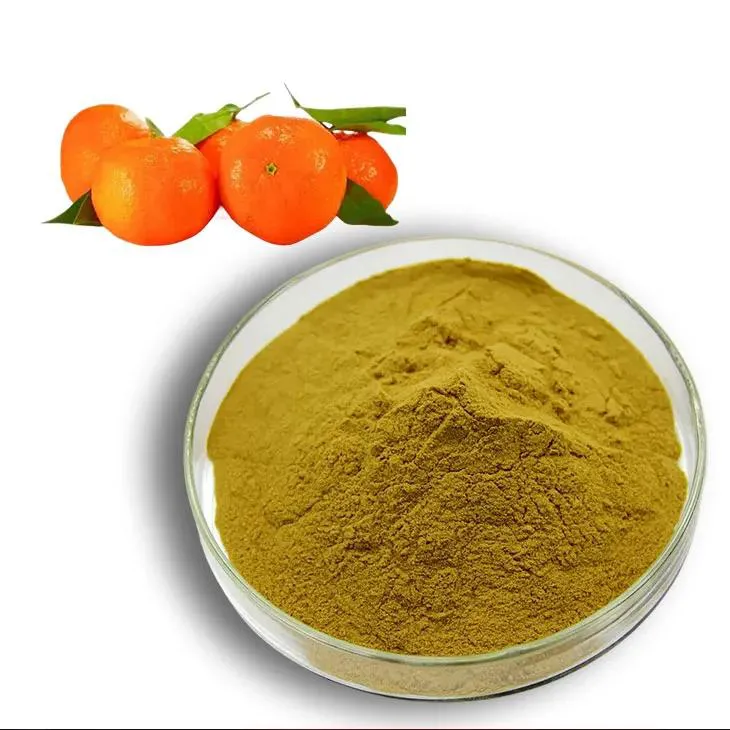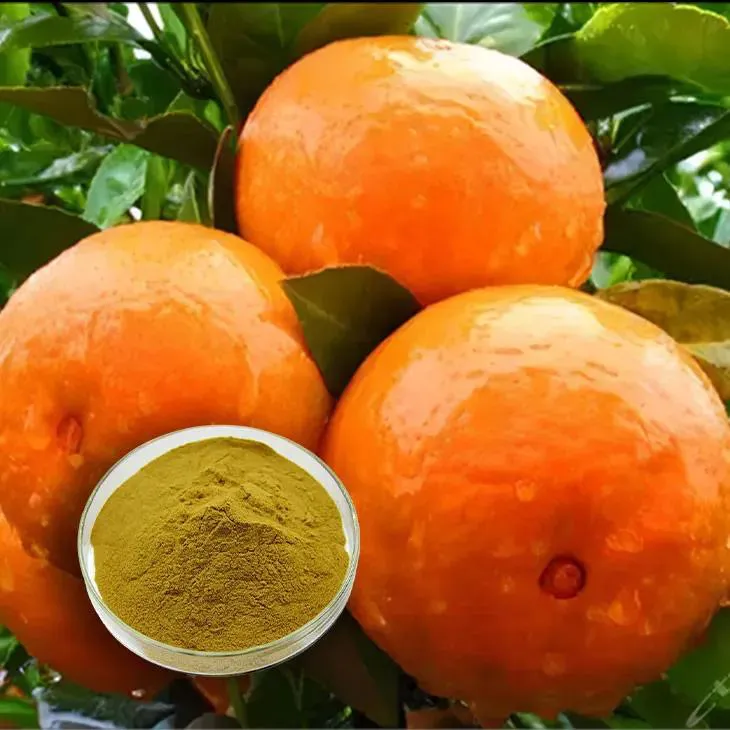- 0086-571-85302990
- sales@greenskybio.com
Shaping the Future: Trends and Innovations in the Citrus Bioflavonoids Industry.
2024-12-11

1. Introduction
Citrus bioflavonoids have long been recognized for their potential health benefits. As the global awareness of health and wellness continues to rise, the Citrus bioflavonoids industry is at the cusp of significant transformation. This article delves into the various trends and innovations that are shaping the future of this industry, exploring how market demands, scientific research, and technological advancements are all playing crucial roles.

2. Market Demands: A Catalyst for Change
2.1. Increasing Health Consciousness
Consumers today are more health - conscious than ever before. They are actively seeking natural products with proven health benefits. Citrus bioflavonoids, with their antioxidant, anti - inflammatory, and other health - promoting properties, are becoming increasingly popular. For example, Hesperidin, a common citrus bioflavonoid, is known to support cardiovascular health. As a result, there is a growing demand for citrus - based supplements and functional foods containing bioflavonoids.
2.2. Expansion in the Cosmetic and Skincare Sectors
The cosmetic and skincare industries are also showing a strong interest in citrus bioflavonoids. These compounds are being incorporated into various products due to their potential to improve skin health. Bioflavonoids can help protect the skin from oxidative stress, reduce inflammation, and enhance collagen production. This has led to the development of citrus - bioflavonoid - enriched creams, serums, and lotions, which are being marketed as natural alternatives for skin rejuvenation.
2.3. The Role of Sustainability
Another important aspect of market demands is sustainability. Consumers are increasingly concerned about the environmental impact of the products they use. In the citrus bioflavonoids industry, this has led to a focus on sustainable sourcing of citrus fruits. Producers are being pressured to adopt environmentally friendly farming practices, such as reducing pesticide use and conserving water. Additionally, there is a growing demand for products that are certified as sustainable, which is driving innovation in supply chain management within the industry.

3. Scientific Research: Unraveling the Potential
3.1. New Health Benefits
Ongoing scientific research is constantly uncovering new health benefits associated with citrus bioflavonoids. Recent studies have suggested that certain bioflavonoids may have a role in preventing neurodegenerative diseases, such as Alzheimer's and Parkinson's. For instance, naringenin has been shown to have neuroprotective effects in pre - clinical studies. This new knowledge is fueling further interest in citrus bioflavonoids and opening up new avenues for product development.
3.2. Understanding Bioavailability
Researchers are also focusing on improving the bioavailability of citrus bioflavonoids. Bioavailability refers to the proportion of a substance that is able to be absorbed and utilized by the body. Many bioflavonoids have low bioavailability in their natural form. Scientists are exploring different methods, such as encapsulation and formulation with other substances, to enhance their absorption. This research is crucial for the development of more effective citrus - bioflavonoid - based products.
3.3. Interaction with the Gut Microbiota
There is emerging evidence that citrus bioflavonoids can interact with the gut microbiota. The gut microbiota plays a vital role in overall health, and certain bioflavonoids may modulate its composition and function. For example, some studies have shown that citrus bioflavonoids can promote the growth of beneficial bacteria in the gut. This area of research holds great promise for the development of novel probiotic - like products containing citrus bioflavonoids.

4. Technological Advancements: Driving Innovation
4.1. Extraction and Purification Technologies
Advanced extraction and purification technologies are revolutionizing the citrus bioflavonoids industry. New methods, such as supercritical fluid extraction and membrane filtration, are being used to obtain high - quality bioflavonoids. These technologies offer several advantages over traditional extraction methods, including higher yields, better purity, and reduced environmental impact. For example, supercritical fluid extraction can selectively extract bioflavonoids without the use of harmful solvents, resulting in a more pure and natural product.
4.2. Nanotechnology Applications
Nanotechnology is also making its mark in the citrus bioflavonoids industry. Nanoparticles can be used to encapsulate bioflavonoids, improving their stability and bioavailability. Nanoparticle - encapsulated bioflavonoids can be more effectively delivered to the target cells in the body. Additionally, nanotechnology can be used to develop smart delivery systems that release bioflavonoids in a controlled manner, depending on the physiological conditions in the body.
4.3. Biotechnology and Genetic Engineering
Biotechnology and genetic engineering are opening up new possibilities for the production of citrus bioflavonoids. Scientists are exploring ways to genetically modify citrus plants to increase the production of bioflavonoids. This could potentially lead to a more sustainable and cost - effective source of these valuable compounds. However, there are also concerns regarding the safety and acceptance of genetically modified products in the market, which need to be addressed.
5. Novel Uses in Various Sectors
5.1. Pharmaceutical Applications
Citrus bioflavonoids are showing great potential in the pharmaceutical industry. Their diverse biological activities make them attractive candidates for the development of new drugs. For example, some bioflavonoids have been investigated for their anti - cancer properties. They may be able to inhibit the growth of cancer cells or enhance the effectiveness of existing cancer treatments. Additionally, bioflavonoids could be used in the development of drugs for treating chronic diseases, such as diabetes and hypertension.
5.2. Food and Beverage Innovations
The food and beverage industry is constantly looking for new ways to incorporate citrus bioflavonoids. In addition to traditional citrus - flavored products, bioflavonoids are being added to a wide range of products, such as energy drinks, fortified waters, and even savory snacks. This not only provides a health boost to consumers but also creates new product differentiation opportunities for manufacturers.
5.3. Animal Health and Nutrition
Citrus bioflavonoids are also finding applications in animal health and nutrition. They can be added to animal feed to improve the health and productivity of livestock. For example, bioflavonoids may enhance the immune system of animals, making them more resistant to diseases. Additionally, in the pet food industry, citrus bioflavonoids are being used to develop products for promoting pet health, such as joint health and skin and coat health.
6. Challenges and Opportunities
6.1. Regulatory Hurdles
The citrus bioflavonoids industry faces various regulatory challenges. Different countries have different regulations regarding the use of bioflavonoids in food, supplements, and pharmaceuticals. This can create difficulties for companies looking to market their products globally. For example, some countries may require extensive safety and efficacy testing before allowing the use of a particular bioflavonoid in a product. However, these regulations also present an opportunity for the industry to ensure the safety and quality of its products through compliance.
6.2. Standardization and Quality Control
Ensuring standardization and quality control is another major challenge in the industry. There is a need for consistent methods of measuring and characterizing citrus bioflavonoids to ensure product quality. Variations in the composition of bioflavonoids from different sources can affect their effectiveness and safety. To address this, industry stakeholders need to work together to develop standardized protocols for extraction, purification, and analysis of bioflavonoids.
6.3. Market Competition
As the demand for citrus bioflavonoids grows, so does the competition in the market. There are many players in the industry, ranging from small - scale producers to large multinational corporations. To stay competitive, companies need to focus on product differentiation, innovation, and cost - effectiveness. This could involve developing unique formulations, targeting niche markets, or investing in research and development to stay ahead of the curve.
7. Conclusion
The citrus bioflavonoids industry is in a state of flux, driven by market demands, scientific research, and technological advancements. The trends and innovations discussed in this article are reshaping the industry, opening up new opportunities for growth and development. However, there are also challenges that need to be overcome, such as regulatory issues and quality control. By addressing these challenges and capitalizing on the opportunities, the citrus bioflavonoids industry can look forward to a prosperous future, with a wide range of applications in various sectors, from healthcare to food and cosmetics.
FAQ:
What are the main market demands driving the trends in the citrus bioflavonoids industry?
The increasing consumer interest in natural health products is a significant market demand. People are more inclined towards natural alternatives for health benefits. Also, the demand for products with antioxidant, anti - inflammatory, and immune - boosting properties has led to a focus on citrus bioflavonoids. Moreover, the growing awareness of the role of bioflavonoids in preventing chronic diseases such as heart disease and cancer has increased their market demand.
How has scientific research influenced the citrus bioflavonoids industry?
Scientific research has played a crucial role in the citrus bioflavonoids industry. It has helped in identifying new bioflavonoids present in citrus fruits. Research has also uncovered the various health benefits associated with these bioflavonoids, such as their role in reducing oxidative stress and improving vascular function. Additionally, studies on bioavailability have led to the development of new formulations and extraction methods to enhance the effectiveness of citrus bioflavonoids in the body.
What technological advancements are being used in the production of citrus bioflavonoids?
Advanced extraction techniques like supercritical fluid extraction are being used. This method allows for more efficient and cleaner extraction of bioflavonoids compared to traditional methods. Nanotechnology is also being explored to improve the bioavailability of citrus bioflavonoids. Through nano - encapsulation, the bioflavonoids can be protected during digestion and better absorbed in the body. Moreover, modern analytical techniques such as high - performance liquid chromatography (HPLC) are used for accurate identification and quantification of bioflavonoids in citrus products.
What are the novel uses of citrus bioflavonoids in different sectors?
In the food industry, citrus bioflavonoids are being used as natural preservatives due to their antioxidant properties. In the pharmaceutical sector, they are being studied for potential drug development, especially for treating conditions related to oxidative stress. In the cosmetic industry, citrus bioflavonoids are used in skincare products for their anti - aging and skin - brightening effects. They are also being explored in the nutraceutical sector for formulating dietary supplements.
How are companies enhancing the bioavailability of citrus bioflavonoids?
Companies are using techniques such as formulation with lipids or other substances that can improve solubility. Some are developing prodrugs or derivatives of citrus bioflavonoids that have better absorption characteristics. Also, the use of encapsulation technologies, like microencapsulation and nano - encapsulation, helps protect the bioflavonoids from degradation in the gastrointestinal tract and enhances their absorption in the body.
Related literature
- Trends in Citrus Bioflavonoid Research: Health Benefits and Applications"
- "Innovations in the Extraction of Citrus Bioflavonoids: A Review"
- "The Future of Citrus Bioflavonoids in the Nutraceutical Market"
- ▶ Hesperidin
- ▶ citrus bioflavonoids
- ▶ plant extract
- ▶ lycopene
- ▶ Diosmin
- ▶ Grape seed extract
- ▶ Sea buckthorn Juice Powder
- ▶ Beetroot powder
- ▶ Hops Extract
- ▶ Artichoke Extract
- ▶ Reishi mushroom extract
- ▶ Astaxanthin
- ▶ Green Tea Extract
- ▶ Curcumin Extract
- ▶ Horse Chestnut Extract
- ▶ Other Problems
- ▶ Boswellia Serrata Extract
- ▶ Resveratrol Extract
- ▶ Marigold Extract
- ▶ Grape Leaf Extract
- ▶ blog3
- ▶ blog4
- ▶ blog5
-
Pure 85% Tomentil Extract.
2024-12-11
-
Kelp Extract Powder
2024-12-11
-
Tongkat Ali Extract Powder
2024-12-11
-
Purple Sweet Potato Extract
2024-12-11
-
Saponin Extract
2024-12-11
-
Genistein
2024-12-11
-
Dandelion Root Extract
2024-12-11
-
Cranberry Extract
2024-12-11
-
Saffron Extract Powder
2024-12-11
-
Curcumin
2024-12-11
-
Red Wine Extract
2024-12-11





















